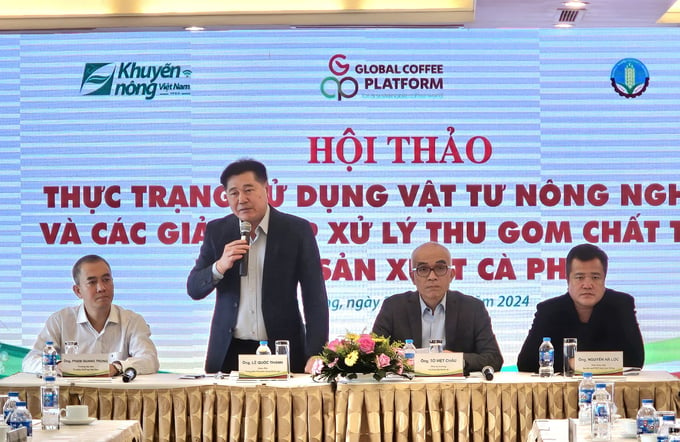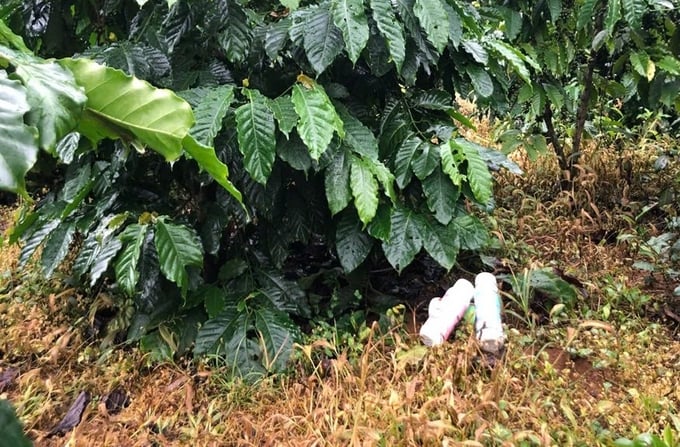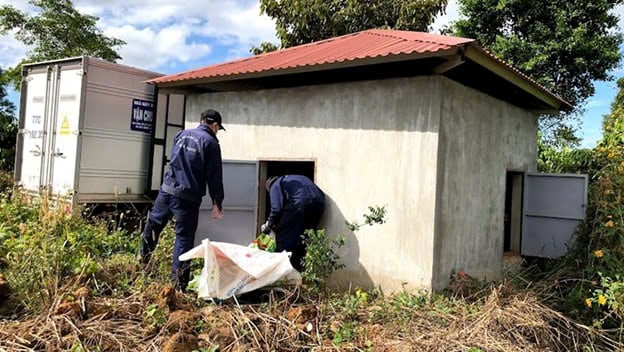November 21, 2025 | 02:33 GMT +7
November 21, 2025 | 02:33 GMT +7
Hotline: 0913.378.918
November 21, 2025 | 02:33 GMT +7
Hotline: 0913.378.918

Mr. Le Quoc Thanh (standing), Director of the National Agricultural Extension Center, believes that the issue of waste in agricultural production is the responsibility of the entire community. Photo: PC.
On the morning of October 28, in Da Lat City (Lam Dong Province), the National Agricultural Extension Center held a workshop titled "Current status of agricultural material use and solutions for waste collection and treatment in coffee production".
The conference focused on assessing the impact of intercropping in coffee gardens on major pests and promoting responsible pesticide use to develop sustainable coffee production in the Central Highlands provinces of Vietnam through a survey conducted with 150 households in Kon Tum, Dak Lak and Lam Dong, with an average area of 1.4 ha/ household.
The survey results showed that most experienced coffee farmers follow proper technical procedures. The majority use mechanical weeding, cutting grass to ensure ground cover, with only a small percentage (5.3%) still applying herbicides.

The amount of pesticide packaging waste generated in coffee production in 2023 is 2.15 thousand tons. Photo: PC.
However, the improper use of pesticides remains common in coffee production. Intercropping coffee with industrial crops and fruit trees is increasingly popular in the five Central Highlands provinces, leading to cross-contamination of pesticides used, making the management of pesticide residues on coffee beans very difficult and complex.
Meanwhile, major export markets for Vietnamese coffee, such as Europe and the United States, have increasingly stringent requirements regarding food safety and pesticide residues, with a continuously updated list of banned substances.

The amount of pesticide packaging waste collected and processed is still limited. Photo: PC.
Experts at the workshop proposed solutions for waste treatment in coffee production, including better training for local officials on pesticide management and enhanced education for farmers on proper pesticide use.
Mr. Le Quoc Thanh, Director of the National Agricultural Extension Center, noted that despite existing regulations, many areas struggle with effective pesticide waste management due to inadequate infrastructure, low public awareness, and lack of coordinated government involvement.
"We need to clearly identify the stakeholders in this waste management chain, starting from pesticide users, the responsibility of waste collectors, to transporters and processors. All these stakeholders must have their capacities enhanced and be held collectively accountable", Mr. Le Quoc Thanh emphasized.
Translated by Phuong Linh

(VAN) Amid vast floodwaters, the spirit of sharing and helping others shown by many people in Gia Lai reached tens of thousands of residents stranded by raging floods.

(VAN) Climate change is set to emerge as a key focus of collaboration within the framework of the Comprehensive Strategic Partnership between Viet Nam and New Zealand.

(VAN) Future veterinarians will be the ones directly deciding how antibiotics are prescribed, administered, guided and managed across thousands of farms nationwide.

(VAN) Argentine Ambassador Marcos Antonio Bednarski says Viet Nam is playing an increasingly influential role in Argentina’s economic and technical engagement in Southeast Asia, as Buenos Aires is seeking long-term partners.

(VAN) Prime Minister requested local authorities to use all available measures to reach residential areas that are deeply flooded, cut off, isolated, or affected by landslides.

(VAN) To confront historic flood surge on Ba and Kon rivers, the Prime Minister requested local authorities to mobilize all available forces, evacuate residents, and ensure reservoirs and dams safety.

(VAN) The United Kingdom (UK) has offered to assist Vietnam in accessing significant financial resources to drive agricultural innovation while simultaneously expanding the market for forest-based carbon credits.